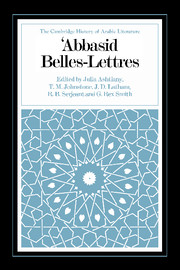Book contents
- Frontmatter
- The ʿAbbasid Caliphate: a historical introduction
- 1 Adab and the concept of belles-lettres
- 2 Shuʿūbiyyah in Arabic literature
- 3 Ibn al-Muqaffaʿ and early ʿAbbasid prose
- 4 Al-Jāḥiẓ
- 5 Al-Ṣaḥib Ibn ʿAbbād
- 6 Abū Ḥayyān al-Tawḥīdī
- 7 Al-Hamadhānī, al-Ḥarīrī and the maqāmāt genre
- 8 Fables and legends
- 9 ʿAbbasid poetry and its antecedents
- 10 Hunting poetry (ṭardiyjāt)
- 11 Political poetry
- 12 Love poetry (ghazal)
- 13 Wine poetry (khamriyyāt)
- 14 Mystical poetry
- 15 Ascetic poetry (zuhdiyyāt)
- 16 Bashshār b. Burd, Abū ʾl-ʿAtāhiyah and Abū Nuwās
- 17 Al-Mutanabbī
- 18 Abū Firās al-Ḥamdānī
- 19 Abū ʾl-ʿAlāʾ al-Maʿarrī
- 20 Literary criticism
- 21 Ibn al-Muʿtazz and Kitāb al-Badīʿ
- 22 Regional literature: Egypt
- 23 Regional literature: the Yemen
- Appendix: Table of metres
- Bibliography
- Index
17 - Al-Mutanabbī
Published online by Cambridge University Press: 28 May 2012
- Frontmatter
- The ʿAbbasid Caliphate: a historical introduction
- 1 Adab and the concept of belles-lettres
- 2 Shuʿūbiyyah in Arabic literature
- 3 Ibn al-Muqaffaʿ and early ʿAbbasid prose
- 4 Al-Jāḥiẓ
- 5 Al-Ṣaḥib Ibn ʿAbbād
- 6 Abū Ḥayyān al-Tawḥīdī
- 7 Al-Hamadhānī, al-Ḥarīrī and the maqāmāt genre
- 8 Fables and legends
- 9 ʿAbbasid poetry and its antecedents
- 10 Hunting poetry (ṭardiyjāt)
- 11 Political poetry
- 12 Love poetry (ghazal)
- 13 Wine poetry (khamriyyāt)
- 14 Mystical poetry
- 15 Ascetic poetry (zuhdiyyāt)
- 16 Bashshār b. Burd, Abū ʾl-ʿAtāhiyah and Abū Nuwās
- 17 Al-Mutanabbī
- 18 Abū Firās al-Ḥamdānī
- 19 Abū ʾl-ʿAlāʾ al-Maʿarrī
- 20 Literary criticism
- 21 Ibn al-Muʿtazz and Kitāb al-Badīʿ
- 22 Regional literature: Egypt
- 23 Regional literature: the Yemen
- Appendix: Table of metres
- Bibliography
- Index
Summary
LIFE
Abū ʾl-Ṭayyib Aḥmad b. al-Ḥusayn, known as al-Mutanabbī, was born in 303/915 into a poor Kufan family. He took up the career of professional panegyrist while still a boy, and early began his travels in search of patrons. For years he had to content himself with offering hyperboles to men of modest distinction. In 322/933 we find him in prison in Ḥimṣ (Horns): according to most Arabic sources, he had attempted to lead a bedouin revolt in the Syrian desert. The religious tincture of his call (of which his collected verse may retain some samples) earned him, according to this tradition, the name al-Mutanabbī, “He who sets up as a prophet.” This appears to have been his only try at advancement by extraliterary means. Gradually he grew in fame, and his patrons in rank. The nine years he spent, from 337/948 to 346/957, at the court of the Hamdanid prince Sayf al-Dawlah in Aleppo were his longest stay with any one patron, and must have been the most satisfying. Sayf al-Dawlah was an Arab prince – a matter of great importance to Mutanabbī – and he truly possessed the virtues – generosity and courage – that are the twin pillars of the Arabic panegyric. It was not an altogether easy relationship: Sayf al-Dawlah was quick to anger, and Mutanabbī had more pride than pliancy. But respect appears to have been mutual. Sayf al-Dawlah accepted Mutanabbī's conditions for the ceremonial recitals: the poet would not have to kiss the ground before the prince, and would not stand to recite.
- Type
- Chapter
- Information
- Abbasid Belles Lettres , pp. 300 - 314Publisher: Cambridge University PressPrint publication year: 1990
- 1
- Cited by



